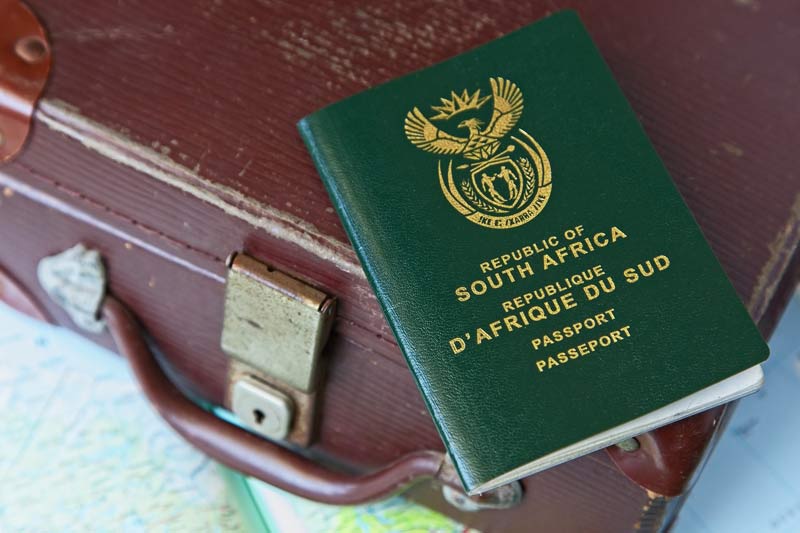1. DO Verify Whether You Need a Visa and Vaccinations
A visa is an endorsement placed within your passport that grants you official permission to enter, leave, or stay in a country for a specified time period. US citizens can visit 14 African countries visa free, but most require a visa and they’ll cost you anywhere from $20.00 to $275.00. It varies by country, but visas can be obtained in advance, either online or from an embassy or consulate your home country, or upon arrival at the airport or at a land border crossing. Similarly, some countries, primarily in West and Central Africa, require all visitors to be vaccinated for the yellow fever vaccine and to present a “Yellow Card” as proof. The lack of a visa and/or evidence of vaccination can result in you being denied entry, so you should always verify the visa and vaccination requirements of the country you’re visiting. The CDC Traveler’s Health site is the best source of information about required and recommended vaccines and medications.
2. DO Respect the Local Culture and Customs
You will be immersing yourself in a culture likely different from your own and it is important to observe the local customs and traditions. You should study some of the local traditions and taboos before travel. Greetings are important in African culture and it is considered rude and disrespectful not to greet when meeting someone or engaging in any transaction. Likewise, respect is very important, particularly for elders and chiefs who hold positions of honor and status. Elders and dignitaries should always be greeted first and in some instances, you may be expected to genuflect before them. Finally, African societies tend to be more traditional and conservative than Western ones (though it can vary by country and region based on religion and culture). Most local men wear pants and shirts or traditional wear. Most local women wear dresses or skirts that fall below the knee and tops that don’t expose shoulders or cleavage. Tight and revealing clothes will stand out and may be frowned upon. Out of respect, you may want to leave the low-cut tops, midriffs, spaghetti straps, short shorts, and miniskirts at home.
3. DO Carry Tissues and/or Wipes
On occasion, you might find that some public restrooms lack toilet paper or there is a nominal fee for a small ration of paper. You should always carry tissue or wipes in case the restroom doesn’t have them. Hand sanitizer is also useful.
4. DO Get Over Your Fear of Bugs and Critters
Many of these countries have tropical and subtropical climates where bugs and critters thrive (especially flies, mosquitos, lizards, and roaches). There’s a chance that you may see a critter in your lodging or at a restaurant and it doesn’t necessarily mean the place is unclean. Most facilities have bug spray available, so ask if needed.
5. DO Visit Both the City and the Village
Contrary to some media portrayals, Africa is about more than poverty and safaris. African cities have gleaming skyscrapers, modern malls, museums, and fancy hotels and restaurants. They’re vibrant and fast-paced with many people selling goods and going about their daily business. The streets stay busy day and night, and the sounds, activity, bright clothes, and strong food aromas will thrill and entice you. By contrast, the rural villages are typically quieter and slower-paced, and the people live in more modest housing. But it is here where traditional customs, dance, and religions shine and you’ll have the best opportunity to immerse in the culture and interact with various ethnic groups. Be sure to spend time in both the city and the village to see the diversity and experience the contrasting lifestyles and cultures.
6. DO Be Open and Willing to Learn a New Way of Life
Africa’s countries are developing and you should not expect everything to operate like at home. Infrastructure for transportation, electricity, water, phone service, or internet might not be up to your country’s standards. Sanitation and waste disposal may be poor. Food may be prepared unlike you’re accustomed and people may eat with their hands. You will likely need to avoid tap water and drink bottled water instead. You may have to pay a small fee to use public restrooms. You may find that there are no set prices and you have to haggle and negotiate for the best deals. You may see street vendors dashing thru traffic and selling everything from snacks to phone chargers and pillows. Addresses aren’t common, so you may encounter difficulty finding a building and need to use nearby landmarks. Weather, power outages, loss of hot water, traffic jams, or other conditions may cause inconveniences or unanticipated delays. Don’t be rude or disrespectful if you encounter any of these circumstances, as they are a part of everyday life on the continent. Embrace the experience and learn from your new environment.
7. DON’T Wear Camouflage Clothing
It is illegal for civilians to wear camouflage clothing in at least 12 African countries, including Benin, Cameroon, Gambia, Ghana, Kenya, Nigeria, Sierra Leone, South Africa, Tanzania, Uganda, Zambia and Zimbabwe. If you decide to wear it, make sure to verify it’s legal in the country you’re visiting. When in doubt, leave it at home.
8. DON’T Photograph Children or Adults Without Their Consent
Not only is it rude to snap a person’s photo and share it on social media without their permission, it may also be culturally inconsiderate or even illegal in some countries. In Senegal, it is against the law to photograph children without their parents’ permission. In Ethiopia, consent is required to publish a photo of a person in a public place. Culturally, some consider photos taboo because it is believed that capturing a person’s image is stealing their soul. Similarly, some strict Muslims believe that photography is forbidden by Islam and would take great offense to being photographed. Even still, certain tribal customs require you to ask first and provide money or a small gift for taking photos. For all these reasons, it is best to ask first and respect the answer given.
9. DON’T Photograph Police Officers, Military Installations, Airports or Government Buildings
Most countries prohibit civilians from photographing police officers, military installations, or airports. Some even prohibit photographs of government buildings. If you’re caught, a uniformed officer may demand that you erase your photos or surrender your memory card. In the worst-case scenario, you may be fined or arrested. When in doubt, ask first or forgo the photo.
10. DON’T Use Your Left Hand
Because the left hand is used for personal hygiene and bathroom functions, it is considered rude and dirty to use your left hand in interactions with others. To be respectful, you should always shake hands, handle money, pick up or pass items, and eat food with your right hand.
11. DON’T Expect Everyone to Speak English
Africa is a huge and incredibly diverse continent. But while it has 54 countries, there are only 25 in which English is spoken as a primary, secondary or official language. And only about 240 million of its 1.2 billion people speak English. Thus, while you will find some English speakers in the major cities of non-Anglophone countries, most will not speak English especially in rural areas. The majority of Africa’s population speak one or more of 2,000 traditional and other languages, with Swahili being the most widely spoken language. To better interact and communicate, you may want to learn a few words of the primary language in your host country.
12. DON’T Stress About Time
Africans generally lead a more relaxed and less rigorously scheduled lifestyle than Westerners. You may find that service is slower than you’re used to and events may start later than scheduled. Stores may open later or close earlier than listed hours of operation. This laxity about time is jokingly called “African Time” and you will almost surely experience it during your time in Africa. Know that everything runs at a slower pace, so just chill and enjoy your time out of the rat race.



Comment (0)